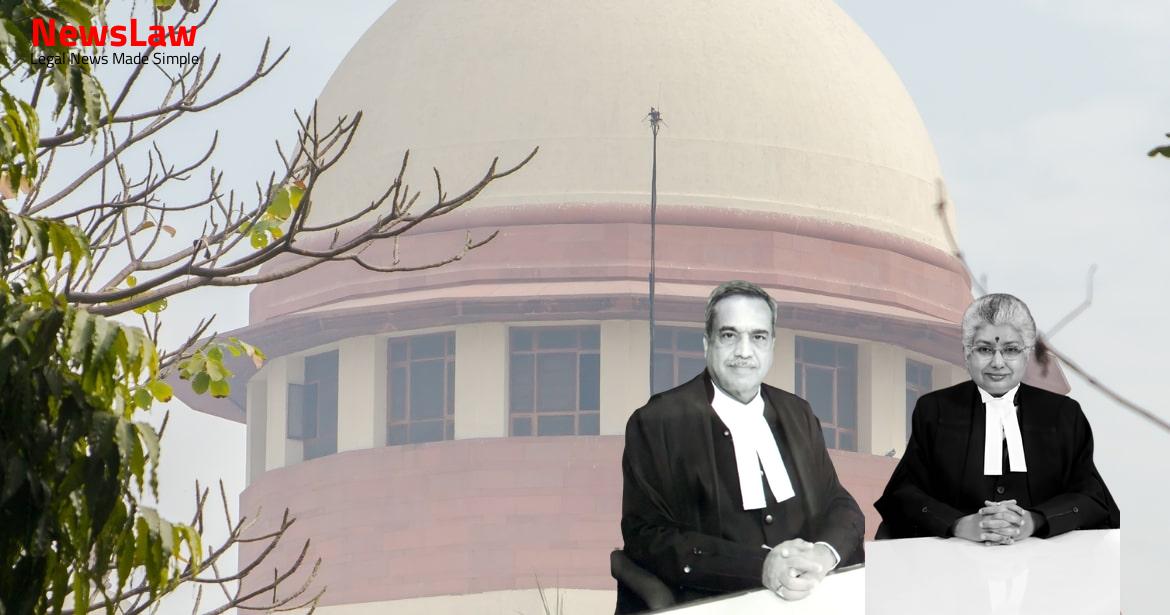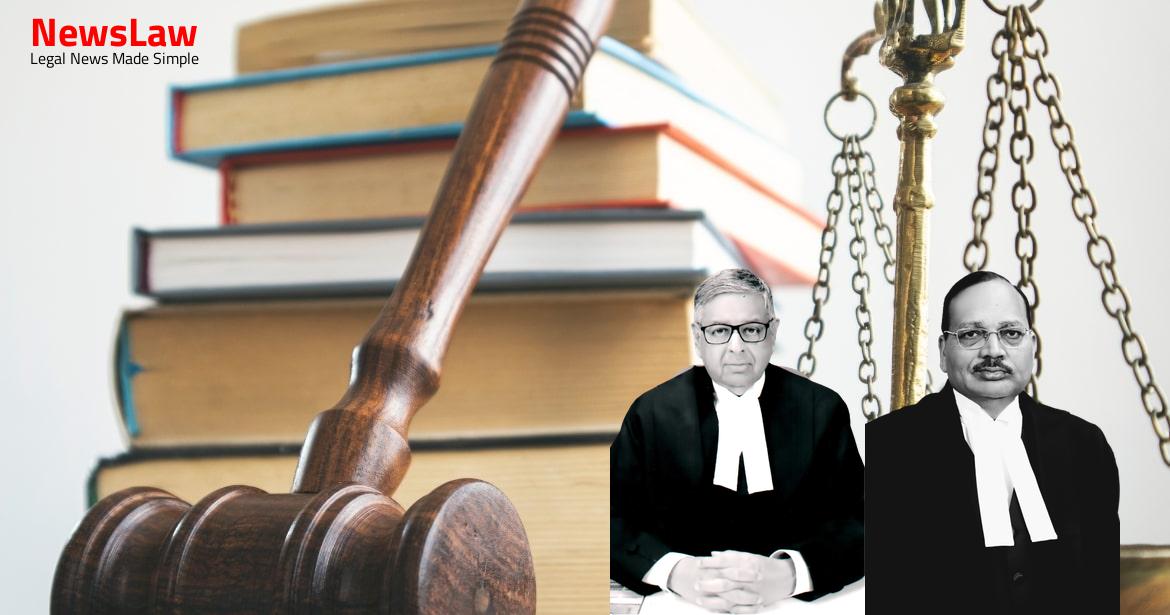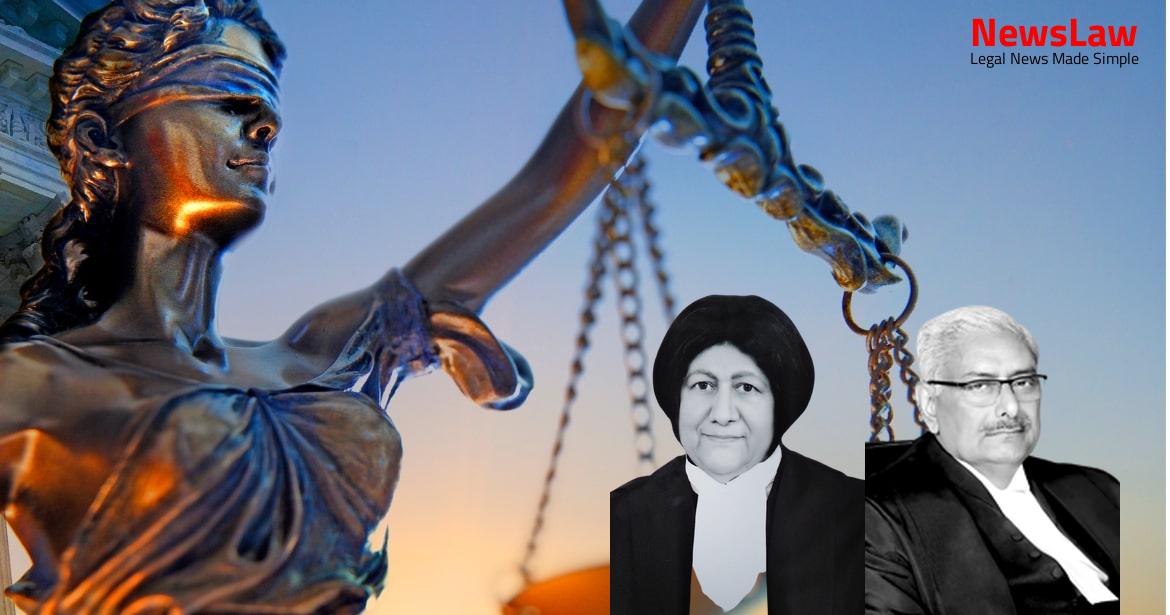The importance of proper legal reasoning in bail orders is highlighted in a recent case where the High Court’s decisions to grant bail were deemed inappropriate due to lack of detailed reasoning. The court emphasized the significance of thorough legal analysis in bail granting processes, shedding light on the complexities involved in balancing individual rights and societal concerns. Follow the case to understand the nuances of legal justifications in bail decisions.
Facts
- The deceased attended a marriage ceremony but did not return home as expected.
- The appellant, wife of the deceased, suspected foul play by the accused persons and their mother.
- Accused persons were seen quarreling with the deceased and later attacking him with lathis resulting in his death.
- The accused dragged the deceased’s body and threw it into a nearby well post the murder.
- Post-mortem examination revealed cause of death as ‘cardiopulmonary arrest due to asphyxia and venous congestion’.
- A charge sheet was submitted against the accused under Sections 302, 201, and 34 of the Indian Penal Code.
- The matter was committed to the Court for trial, and the accused were granted bail which is being appealed by the appellant.
- Bail application by Kalu Singh rejected on 05 September, 2019.
- Respondents-accused remained in judicial custody for nearly four months before being granted bail by the High Court.
- Bail applications preferred before the High Court on 9 September, 2019, and 17 October, 2019.
- Separate bail applications under Section 439 of CrPC filed before the Additional Sessions Judge, Rajsamand, Rajasthan.
- Bail application by Kishan Singh rejected on 09 July, 2019, due to gravity of alleged offences and prima facie evidence.
- High Court granted bail to respondents-accused in the case arising from FIR No. 229 of 2019.
Also Read: Analysis of Tax Exemption for Enemy Properties
Arguments
- The appellant’s counsel contended that the accused might interfere with the investigation, abscond, or cause harm if not remanded to custody.
- Counsel argued that the bail granted to the accused was contrary to established legal principles and previous court judgments.
- The counsel referred to a previous case to highlight that the accused had been in custody for a short time before being released on bail, making the bail orders untenable.
- It was emphasized that before granting bail, the court must consider factors justifying bail along with societal concerns, serious nature of the crime, and the evidence on record.
- Allegations were made that after being released on bail, the accused threatened the appellant, creating a risk to the appellant and the witness.
- Reliance was placed on another case to assert that while the court does not need to examine evidence in detail during bail hearings, it must provide prima facie reasons for granting bail.
- It was argued that the severity of the offences, the stage of the trial, and the risk of accused tampering with evidence justified keeping them in custody.
- The counsel criticized the High Court for granting bail without proper reasoning, considering the potential life imprisonment the accused might face.
- Allegations of threats by the accused and attempts to implicate them falsely were raised, emphasizing the need for a fair trial.
- The post-mortem report suggesting the cause of death as cardio pulmonary arrest was used to argue that the accused might not be responsible for the death.
Analysis
- An order granting bail to an accused must be based on reasoning that validates the grant of bail.
- If the bail order is passed in a casual and cryptic manner, it can be set aside by the Supreme Court under Article 136 of the Constitution of India.
- The Latin maxim ‘cessante ratione legis cessat ipsa lex’ (reason is the soul of the law) is applicable in such cases.
- If new circumstances arise after bail has been granted, the State can approach the High Court for cancellation of bail under section 439(2) of the CrPC.
- Recent decisions of the Supreme Court emphasize the importance of proper reasoning and justification in bail orders.
- Courts are not required to provide elaborate reasons while granting bail, especially at the initial stage.
- The post-mortem report indicates that the deceased was murdered, despite the defense’s claim of a sudden cardio pulmonary arrest.
- The prosecution has established a prima facie case against the accused, including threats made by one of the accused upon release on bail.
- The gravity of the alleged offenses was considered in previous bail rejections by the Additional Sessions Judge.
- The High Court did not adequately consider important aspects of the case when granting bail to the accused.
- There is a possibility of the accused influencing or threatening witnesses if released on bail.
- Courts cannot make decisions on bail solely based on the likelihood of conviction or acquittal, but must consider various aspects of the case.
- The accused face serious charges under Sections 302, 201, and 34 of the IPC related to the murder of the appellant’s husband.
- The allegations involve attempts to conceal the murder by disposing of the body and the weapons used in a nearby well.
- The State of Rajasthan did not file an appeal against the order granting bail, even though it could have done so if the bail order was considered perverse, illegal, or based on ignored material aspects.
- The High Court’s orders granting bail to the accused lack detailed reasoning and overlook crucial aspects of the case.
- The High Court’s decisions to grant bail were deemed inappropriate as they were based on cryptic and casual orders without cogent reasoning.
Also Read: SC Clarifies: Choice of Depreciation Method Allowed Until Return Filing
Decision
- The bail bonds of the respondents-accused stand cancelled.
- They are directed to surrender before the concerned jail authorities within two weeks.
- The orders dated 9 September, 2019, and 17 October, 2019 are set aside.
- The respondents-accused are currently on bail and the appeals have been allowed.
Case Title: KAMLA DEVI Vs. THE STATE OF RAJASTHAN (2022 INSC 299)
Case Number: Crl.A. No.-000342-000342 / 2022



